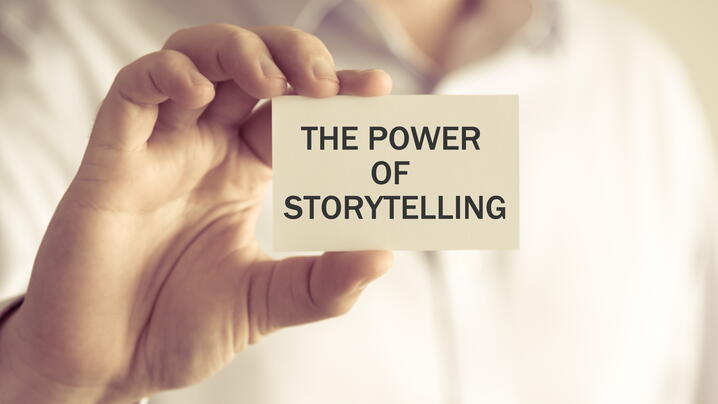
These are your final days to enjoy all of the groundbreaking content offered from Moving the Needle, ICMA’s inaugural Equity Summit, and there is still so much to take in from the engaging topics covered by speakers. From the array of subjects, tools, resources, and stories presented, the closing keynote speaker shared a powerful story that you do not want to miss. Melissa Wiley, deputy town administrator for Erie, Colorado, closed out this landmark event with her unique story of trauma, growth, and rebirth into a champion for healing macro systems through micro relationships and the power of story. This session explores how story can facilitate healing relationships during divisive times and the endless possibilities society can reach when we focus on solving the struggles in our own hearts first.
The Negative Impact of First Impressions

deputy town administrator
Erie, Colorado
When most people see Melissa Wiley for the first time, the main thing they think or even ask out loud is, “What happened to her face?” Reducing a person to his or her appearance and taking small digs like this is known as a microaggression. While it may not be intentional to hurt someone’s feelings this way, the collection of small derogatory remarks can slowly eat away at one’s confidence and self-worth. Wiley compared microaggressions to that of removing a single jelly bean from a jar over and over again. If everyone keeps taking just one, there will eventually be nothing left.
Same goes for all microaggressions that can result from first impressions. Rather than letting these preconceived notions take hold of your impression of someone, make an effort to look deeper. Think of one’s whole self as an iceberg, with their outward appearance being just the tip and their story being the other 90 percent of the iceberg that is hidden beneath the surface. This is where the power of story truly comes into play. Wiley challenges the audience to assess their first impressions of her both before and after hearing her story, encouraging them to share how these impressions of her change once they get a look at the “whole iceberg.”
How Stories Shape Impressions
Wiley is the granddaughter of a Japanese immigrant and spent much of her time helping her grandmother navigate the United States. She gained both a deep appreciation for Japanese culture as well as a firsthand look at the challenges that come with navigating multifaceted government processes while experiencing language and cultural barriers. This sparked her inspiration to do her part to help improve the government experience for all. Wiley also survived a childhood dog attack that left her permanently disfigured even after countless surgeries. One thing that stuck with Wiley through this extremely distressing time were words from the nurse who first showed Wiley her face after the attack; “You will have a beautiful life.”
After powering through this traumatic experience, Wiley has amassed a litany of titles including director of Denver Peak Academy, city and county of Denver innovation and analytics team member, U.S. economic advisor to Northern Ireland, U.S. State Department and the Policy Lab division of the Children’s Hospital of Philadelphia team member, and her current local government role as the deputy town administrator for Erie, Colorado. She is also a wife and mother, who runs interactive sessions to help children overcome bullying through storytelling in her spare time. Without a doubt, Wiley has built the beautiful life that her nurse predicted all those years ago.
Once you listen to Wiley’s powerful story and all she has managed to accomplish, despite extreme adversity, it feels wrong to reduce her many positive works down to the typical first impression of “What happened to her face?” Yet, people still manage to do this on a regular basis. But why? Why do people feel the need to take that proverbial jelly bean from the jar rather than learn who someone really is? It is up to us to change the status quo to learn one’s story rather than make assumptions.
Knowing Wiley’s story humanizes her and shifts how you see her completely. The same goes for everyone. We all have a story and deserve to be seen, heard, and humanized. Taking the time to listen to someone’s story will help give perspective to their struggles and emotions, which will facilitate empathy and a deeper connection.
Building and Sustaining Healthy Relationships
Knowing one’s story is the first step to building and sustaining healthy relationships. People operate out of both fear and love, and learning their story means you are getting to the root of why they have the emotions they do.
Relationships thrive on small acts of connection and kindness. If you haven’t connected to someone through regular, compassionate conversations, then you should refrain from giving them critical feedback.
In order to facilitate closer connection, it is important to practice methods of listening, rather than hearing. This comes from earning one’s trust, dedicating time to understand their situation, seeking out their point of view, giving them empathetic responses, validating them and their experiences, and inviting them to speak longer by asking open-ended questions, to name a few. Making a conscious effort to practice these listening methods will help you humanize and foster authentic relationships with the people around you.
It is up to you to open up as well. Be willing to share your story and let people get to know the real you. Don’t let a remote work environment or posting your thoughts on social media be your justification for not building authentic connections. Allow yourself to be vulnerable, refraining from judgement and self-preservation, to break down the binary narratives that keep us separated. With time, your continuous effort to make these seemingly small connections with the people around you will transform the hearts of those in your community for the better.
For more information on steps you can take to build a more connected and equitable community, visit the ICMA Equity Summit platform. If you haven’t signed up yet, you can register here. Access an array of invaluable information on the Equity Summit platform until July 11. If you are having a hard time figuring out what is next on your path to equity, the discussions and tools presented will give you some much-needed inspiration. Let your desire to transform the hearts of those in your community be your inspiration to lead your organization on a path to equity and join us as #ICMAMovesTheNeedle.
New, Reduced Membership Dues
A new, reduced dues rate is available for CAOs/ACAOs, along with additional discounts for those in smaller communities, has been implemented. Learn more and be sure to join or renew today!
